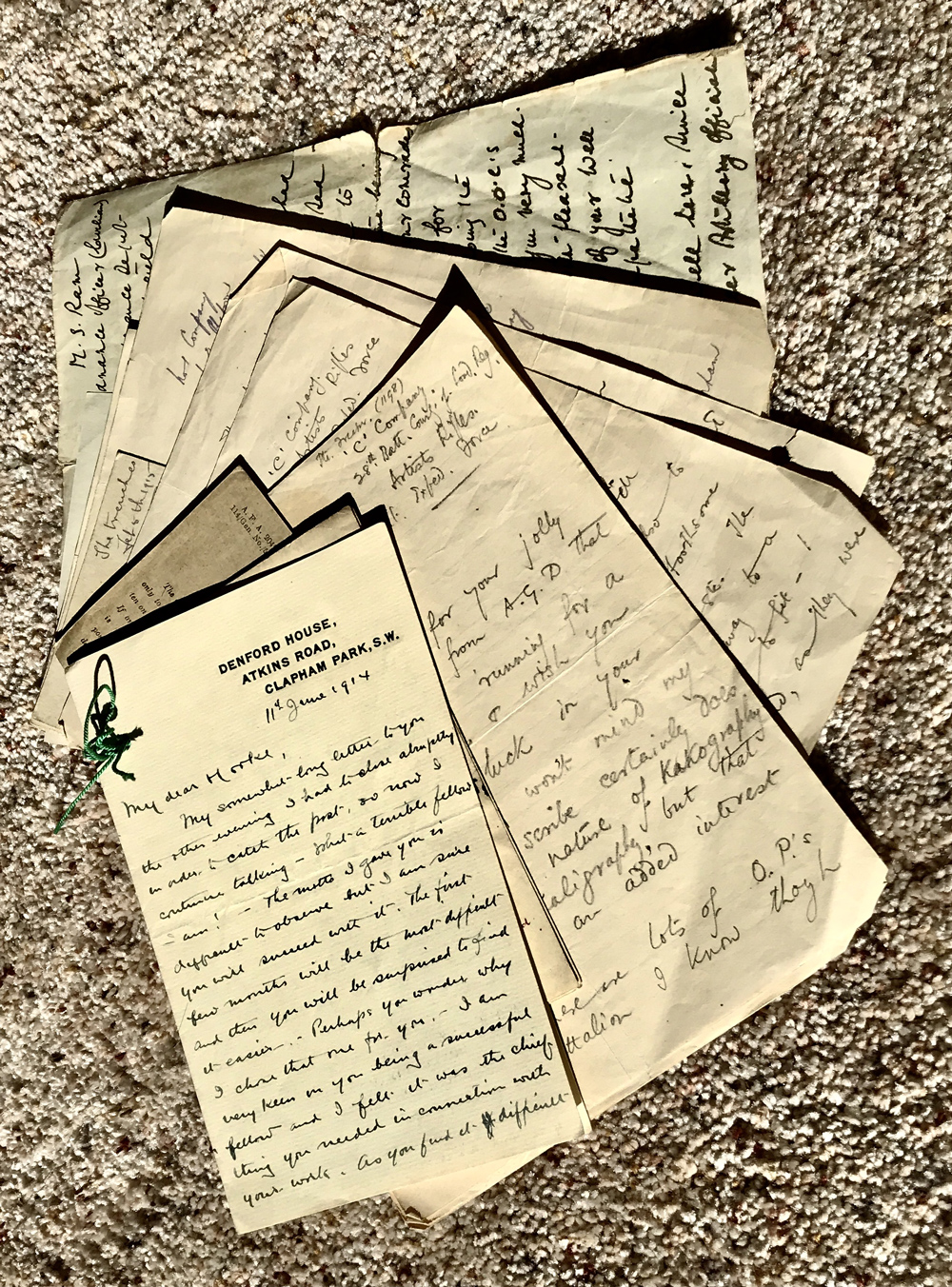 The following letters make up a collection of letters saved by my Grandfather, Cyril Hooke, from friends already serving with the B.E.F. (British Expeditionary Force) in France/Belgium during the early stages of WW1. Cyril was still completing his education and did not begin his training as an Officer until 1916 when he himself was sent to war. My Grandmother, Elaine Hooke, kept these letters in an envelope labelled “Miscellaneous Letters received up to end 1916 including some from the B.E.F.” Grandpa Cyril had written brief notes on a couple of them.
The following letters make up a collection of letters saved by my Grandfather, Cyril Hooke, from friends already serving with the B.E.F. (British Expeditionary Force) in France/Belgium during the early stages of WW1. Cyril was still completing his education and did not begin his training as an Officer until 1916 when he himself was sent to war. My Grandmother, Elaine Hooke, kept these letters in an envelope labelled “Miscellaneous Letters received up to end 1916 including some from the B.E.F.” Grandpa Cyril had written brief notes on a couple of them.
The collection begins with one of a different nature from a clergyman, I think (the name is not clear), and I assume this was Cyril's vicar and was in connection with his confirmation classes at Balham Parish Church. The letter includes a clear description of the bIblical way of salvation through Christ, something which I am sure my Grandfather responded to, recognising the fragility of life at that time of war prior to being called up. Its is perhaps also noteworthy that he kept this particular letter along with his precious collection of other letters from his friends at the Front.
The collection ends with another oddity from the end of WW2, October 1945, being a request for a reference from an Indian Officer who served under Lt Col Cyril G Hooke, as he was then. It includes the following sentence about Cyril which, although rather ingratiating, still represents an Indian view of the Hookes and Oakdens found in other archive material as compassionate, kind and respectful of their relationship with the Indians who served them and who they were in India to serve.
I quote, "I cannot think of anyone under whom I have served with so much confidence and for whom I I have so much regard than you. You will not accuse me as flattering your vanity when I tell you that I have often thought that the relations between England and India would have been more harmonious and happy if we had more representatives of the English race like you."
But back to 1914... these letters are a poignant reminder of how the war gradually developed into the most horrific war in human history to date. Tragically, it was not "the war to end all wars" and humanity has conspired to continue to wage war at different times and places with ever increasing levels of destructive power.
From: Denford House, Atkins Road, Clapham Park S.W.
11 June 1914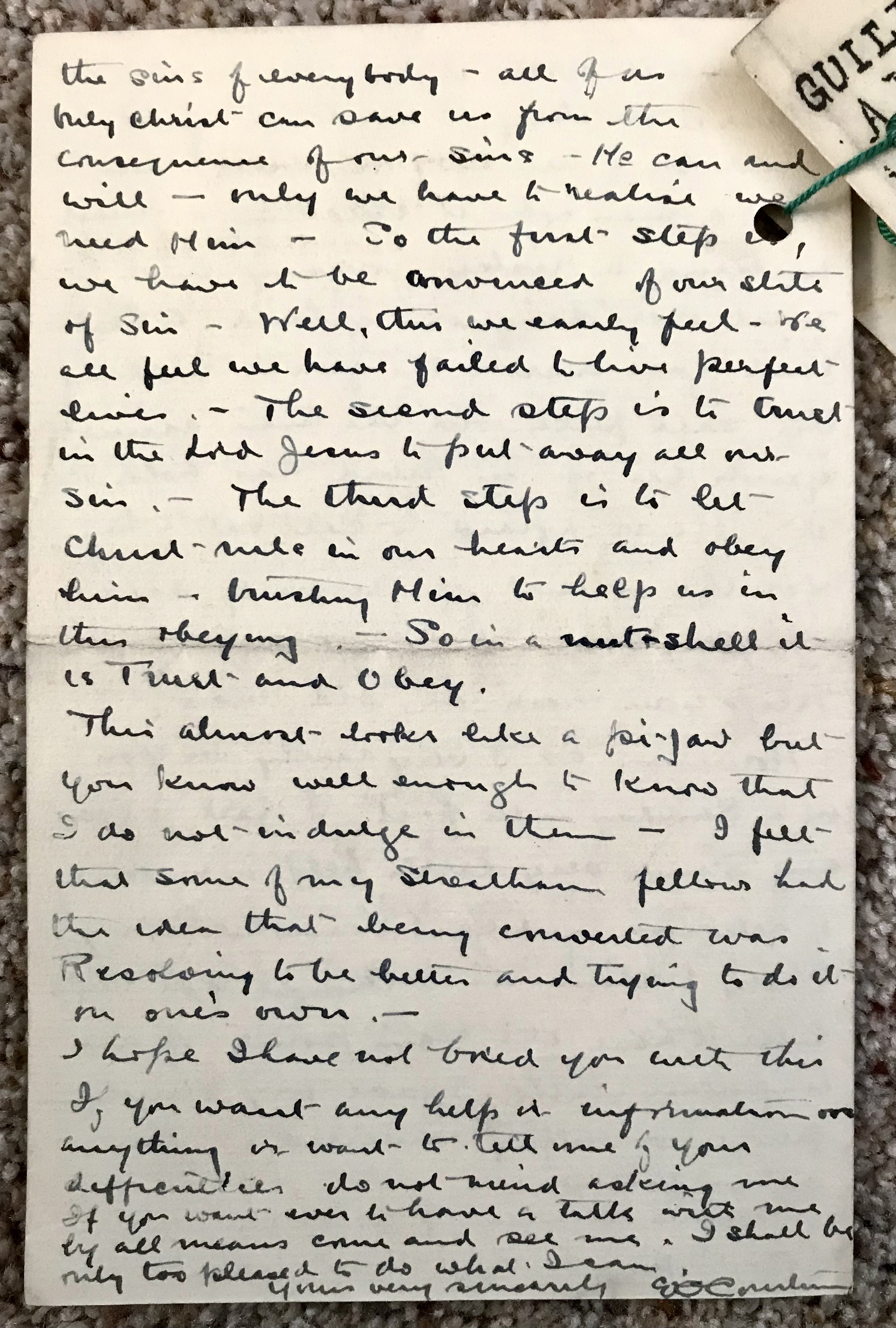
My dear Hooke,
My somewhat long letter to you the other evening I had to close abruptly in order to catch the post, so now I continue talking – what a terrible fellow I am! – The motto I gave you is difficult to observe but I am sure you will succeed with it. The first few months will be the most difficult and then you will be surprised to find it easier. Perhaps you wonder why I chose that one for you – I am very keen on you being a successful fellow and I felt it was the chief thing you needed in connection with your work. As you find it difficult I think it shows what will help you in your work. So it is well with trying to keep on with it. You have some splendid aspirations and we must try to make some of them actualities. I feel sure that as you are trying in this direction it shows you are improving – however let me help and I will do whatever I can for you.
Of course you have to do a certain amount of cricket for the sake of your School XI but do not let the cricket interfere too seriously with the school work. However you will no doubt be able to give to each their right and just proportion. When it makes you late on Fridays I miss you, but as it is for your school I must be content with it so.
There is one thing I wondered if I could be of help to you but I am but a man who is watching a friend making a risky journey in a mist over dangerous ground. A handrail goes across the ground making the safe path, but the man cannot quite see if his friend has hold of it. He is afraid to call out to him; for the friend, if perfectly safe might say, “Don’t get excited. Keep your hair on old man.”
However, as I rarely see you on a Sunday – in fact I feel I give my Scouts very little help in matters of religion and fail somewhat in my duty to them – I thought you might like to have the main points of an important talk I gave my Streatham fellows on being converted – they are as follows!
The whole idea of conversion is God’s plan is that Christ suffered for the sins of everybody – all of us. Only Christ can save us from the consequences of our sins – He can and will – only we have to realise we need Him – so the first step is, we have to be convinced of our state of sin. Well, this we early feel – we all feel we have failed to live perfect lives. The second step is to trust in the Lord Jesus to put away all our sin. The third step is to let Christ rule in our hearts and obey Him – trusting Him to help us in this obeying. So in a nutshell it is Trust and Obey.
This almost looks like a joi-jaw but you know well enough to know that I do not indulge in them – I felt that some of my Streatham fellows had the idea that being converted was resolving to be better and trying to do it on one’s own.
I hope I have not bored you with this. If you want any help and information on anything or want to tell me of your difficulties do not mind asking me. If you want ever to have a talk with me by all means come and see me. I shall be only too pleased to do what I can.
Yours very sincerely
Name indecipherable.
Attached was a carefully handwritten leaflet as follows:
GUILD OF SAINT ANDREW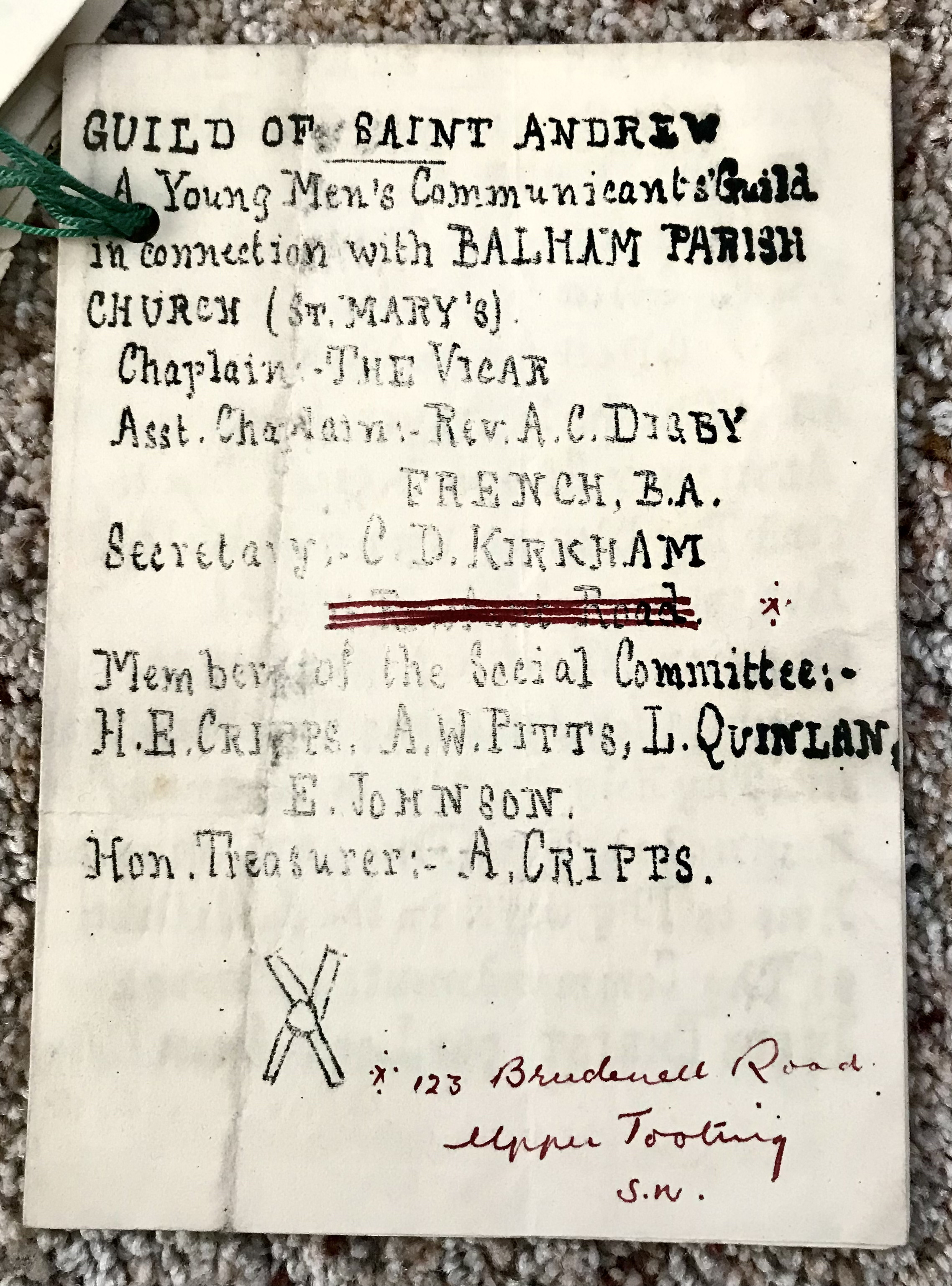
A Young Men’s Communicants’ Guild
in connection with BALHAM PARISH CHURCH (St MARY’S)
Chaplain:– THE VICAR
Asst. Chaplain:- Rev A.C.DIGBY FRENCH B.A.
Secretary:- C.D.KIRKHAM
Address crossed out and replaced at the bottom with 123 Brudenell Road, Upper Tooting S.W.
Members of the Social Committee:-
H.E.CRIPPS, A.W.PITTS. L.QUINLAN, E.JOHNSON
Hon. Treasurer:- A.CRIPPS
ORDER OF SERVICE
Priest. In the Name of the Father etc.
All. Our Father etc.
The Apostles’ Creed
Priest. Collect for Purity
Collect for the Week
All. The Guild Prayer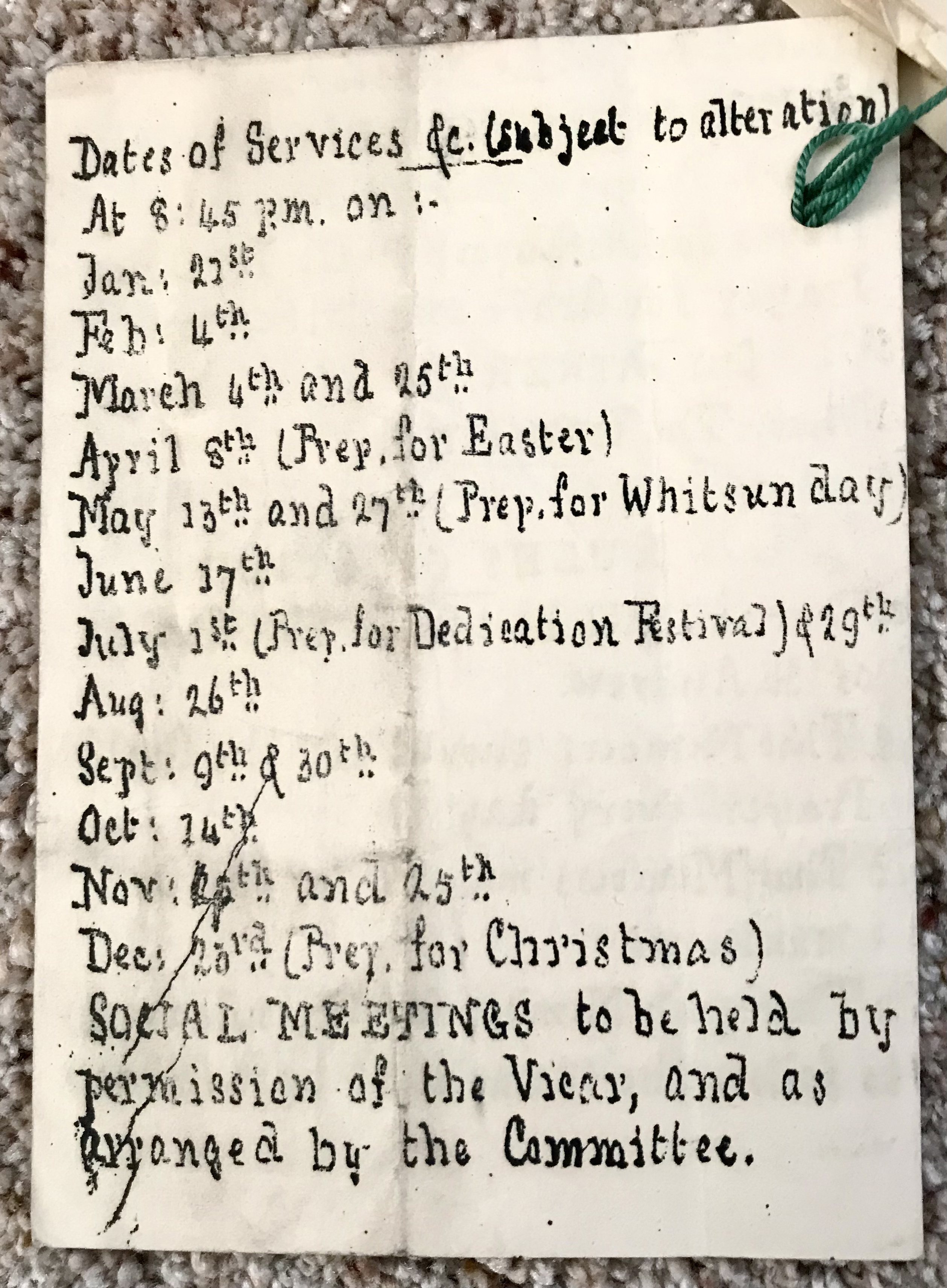
ALMIGHTY GOD we beseech Thee to send Thy blessing upon our Guild. Pour out upon it the spirit of Christian fellowship, and use its members for spreading Thy Word, that, like Thy Holy Apostle, St Andrew, they may readily obey Thee and give their lives to Thy work in the fulfilling of Thy Commandments;
Through JESUS CHRIST our Lord. Amen
Priest. Prayer for Missions
HYMN and ADDRESS
Priest. Prayer of Humble Access
Prayer for and against all Perils, or
Prayer for Grace and Protection.
All. Our Father etc.
Priest. The BLESSING
RULES OF GUILD
- That it shall be called The Guild of St. Andrew.
- That Members should say the Guild Prayer every day.
- That Members must be regular Communicants.
- That each Member should endeavour to follow the example set by St. Andrew.
Dates of Services etc. (subject to alteration) (Worked this out to be 1914 with services on Wednesday evenings)
At 8.45pm on:-
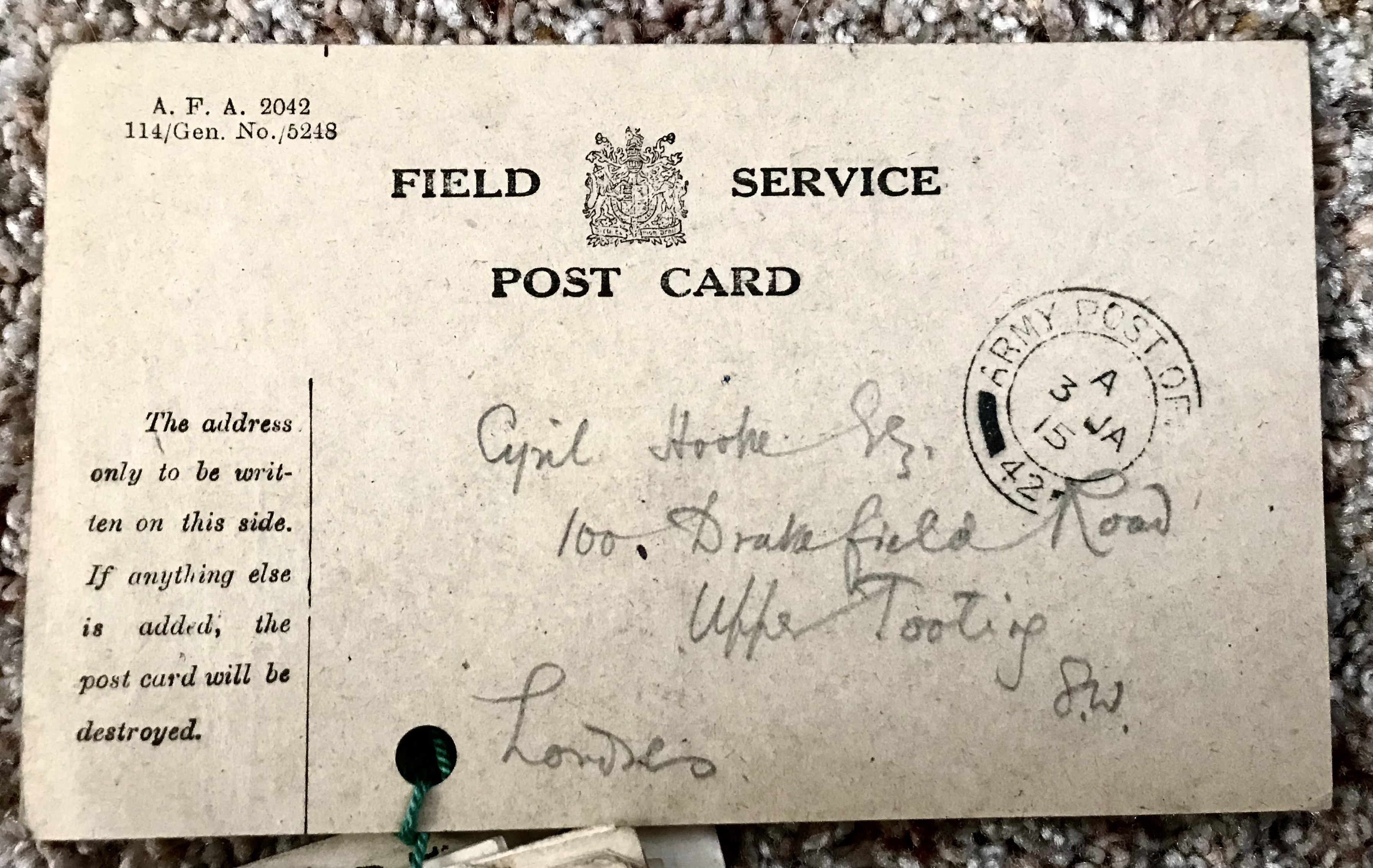 Jan 21st, Feb 4th, March 4th and 25th, April 8th (Prep for Easter), May 13th and 27th (Prep for Whitsunday), June 17th, July 1st (Prep for Dedication Festival) & 29th, Aug 26th, Sep 9th & 30th, Oct 14th, Nov 4th & 25th, Dec 23rd (Prep for Christmas)
Jan 21st, Feb 4th, March 4th and 25th, April 8th (Prep for Easter), May 13th and 27th (Prep for Whitsunday), June 17th, July 1st (Prep for Dedication Festival) & 29th, Aug 26th, Sep 9th & 30th, Oct 14th, Nov 4th & 25th, Dec 23rd (Prep for Christmas)
SOCIAL MEETINGS to be held by permission of the Vicar, and as arranged by the Committee.
To: Cyril Hooke at 100 Drakefield Road, Upper Tooting, London
31 Dec 1914
Field Service Postcard sent confirming receipt of letter and parcel from Cyril on 19 Dec 1914
Signed by Allan Freaker
Note from Cyril added later: Killed Paschendaele November 1917 when I was at Hooge.
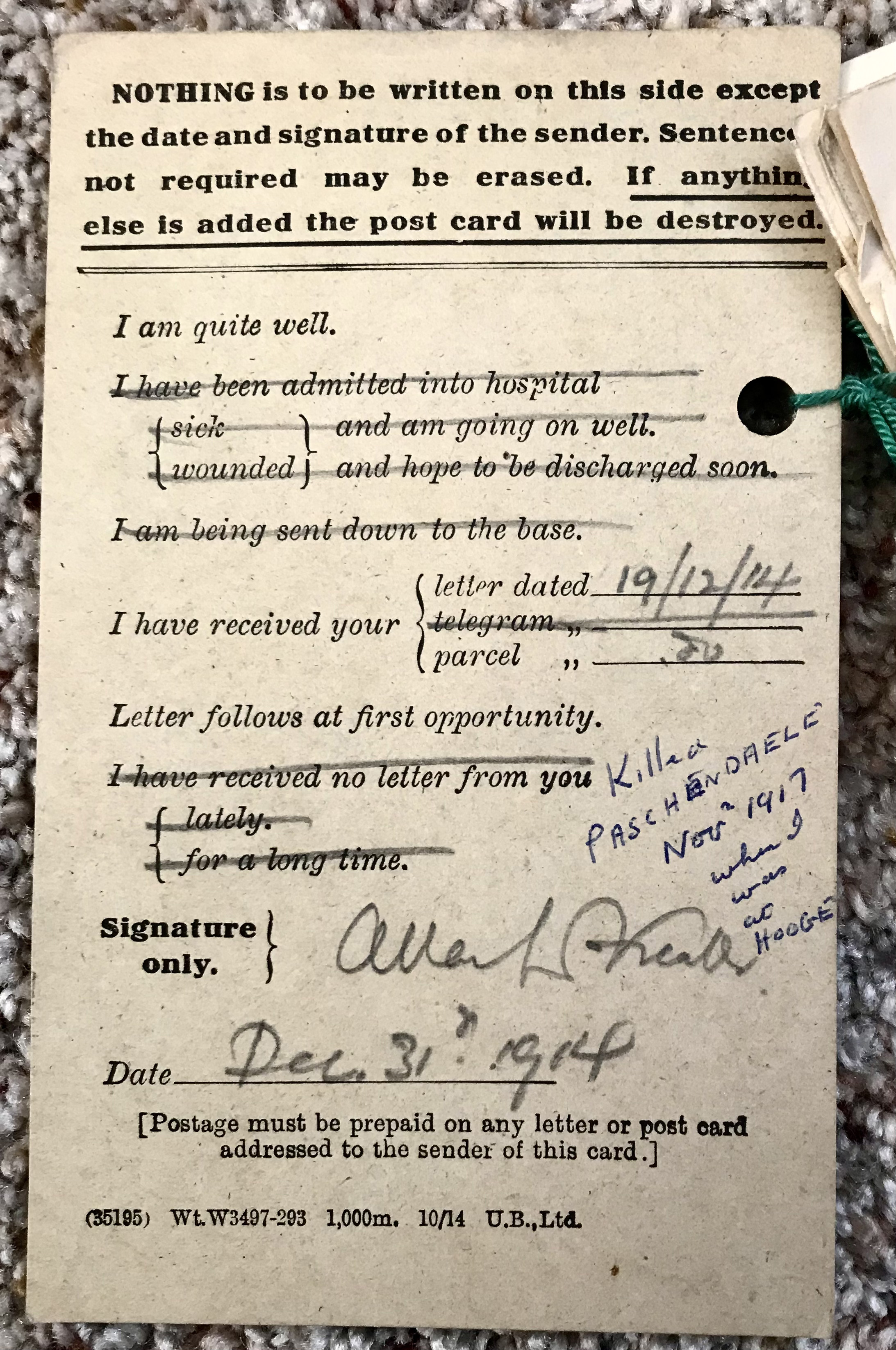
From: Private Lionel Freaker (1198) ‘C’ Company, 28th Battalion County of London Regiment, Artists Rifles, Brit Exped Force.
11 Dec 1914
Dear Cyril,
Thanks so much for your jolly letter. I had heard from A.G.D. that you were in the running for a R.E. commission and wish you the very best of luck in your efforts. If you won’t mind my saying it your scribe certainly does partake of the nature of kakography rather than kaligraphy but that of course lends an added interest to your remarks.
Yes there are lots of O.P.’s in the battalion I know though I can’t give you their names.
You will be glad to hear that we have been in the trenches but suffered very little in the way of casualties – Graham I fancy is having a very thick time. The soil is mostly clay and during rainy weather the trenches get into a really appalling state – in some cases of course they are flooded with water. The roads too are in a very little better condition. There’s a typical section on the back. (See below)
The papers talk a lot of bombast it seems to me for the Germans are jolly good fighters and there will be heaps more before we’ve finished – in fact any man that gets back to England alive should be very thankful.
It is very kind of you to want to send me luxuries, but a good assortment arrives from home. Perhaps peppermint lozenges and other sweets or OXO cubes would be rather useful but do not trouble unnecessarily. Letters are as much appreciated as anything.
Please give my love to all the fellows and remember me to your people.
With best wishes for your early success
Ever Yours
Lionel

Lionel Freaker is Allan Lionel Freaker who was killed on Tuesday 30th October 1917 at Paschendaele as noted by Cyril above "in November 1917 when I was at Hooge."
More information can be found here: https://livesofthefirstworldwar.iwm.org.uk/lifestory/1252443
Record: FREAKER, ALLAN LIONEL 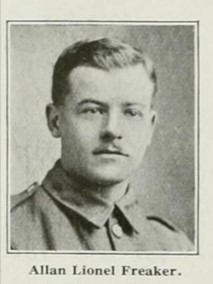
Son of Charlton H. Freaker and Emily Lavinia Freaker, of 12, Culmstock Rd., West Side, Clapham Common, London.
First World War casualty details for Serjeant Allan Lionel Freaker London Regiment (Artists' Rifles).
Date of death Tuesday 30 October 1917 (aged 26)
Cemetery: TYNE COT MEMORIAL Cemetery/memorial reference: Panel 153.
Christ's Hospital (Bluecoat School) - Roll of Honour
From: Lionel Freaker, “C” Company, Artists Rifles, Brit Exped Force
The Artists Rifles was a popular unit for volunteers. It had been increased to twelve companies in 1900 and was formed into three sub-battalions in 1914, and recruitment was eventually restricted by recommendation from existing members of the battalion. It particularly attracted recruits from public schools and universities; on this basis, following the outbreak of the First World War, a number of enlisted members of the Artists Rifles were selected to be officers in other units. This exercise was so successful that, early in 1915, selected Artists officers and NCOs were transferred to run a separate Officers Training Corps, the remainder being retained as a fighting unit. Over fifteen thousand men passed through the battalion during the war, more than ten thousand of them becoming officers. The battalion eventually saw battle in France in 1917 and 1918, and suffered higher casualties than those of any other battalion. Members of the Regiment won eight Victoria Crosses, fifty-two Distinguished Service Orders and nearly a thousand other awards for gallantry.
8th Jan 1915
My dear Cyril,
I am not certain whether I ever wrote to thank you for your parcel – it was really jolly good of you to do it. Will you give my best thanks also to your sisters for the very toothsome sweetments and the mittens etc. The latter I have given away to a man that hadn’t any to fit – I hope she won’t mind, as they were a very good pair.
The heartiest congrats to yourself on the latest news. I understand that as nothing but the engineer job will satisfy – you’re having a further shot later; well best of fortune.
Our 6” R.G.A. guns are topping things. They appear to outgun those of the enemy – on the road they leave a slight imprint about 1’ 6” wide and 3” deep to each wheel. Our men have now Minenwerfers* in the trenches to fire bombs similar to the German article.
*During World War I, various types of "werfer" (German for "thrower" or "launcher") were used to fire bombs and other explosive projectiles from the trenches. The German Army developed different types of Minenwerfer (mortar-like trench weapons) to support infantry attacks and defenses.
We are at present in billets – most fortunate in the present bad humour of the elements – Graham must be having a very thin time in the trenches. Please remember me to an of your people with best wishes for 1915.
Sincerely yours
Lionel
From: Roland Harris, The Trenches
To: Cyril Hooke at 100 Drakefield Road, Upper Tooting, London
8th Feb 1915
Dear Cyril,
Thank you so much for your nice letter and parcel which arrived quite intact. I am sorry I have not been able to write before but we do not get much time in the trenches for writing. My brother seems to like St Pauls immensely. I am so glad. Do write again when you have time will you. I must close now will write later.
Yours very sincerely,
Roland G Harris
From: Graham Freaker, No 1 Company, No 3 Platoon, London Rifle Brigade,
Sunday 28 Feb 1915
Dear Cyril,
Thanks awfully for your letter old man. It is jolly good of you to write to offer.
Yes, it is very hot stuff, so many OPs being mentioned in despatches. It is certainly something to be proud of, more interesting just now than a strong rugger side. I don’t know yet whether your OJC field day has come off yet. I saw some photo of the MJs enjoying a day out. One was waving a rather merrily apparently meant to represent a machine gun. If so, they had taken up a quaint position.
I really must write to Mr Barham.
100 yards away from the Germans our piece of trench was successfully damned so that we kept out the floods the other people had.
In the trenches we were in before, there was no field of fire as there was 50 yds of thick wood in front and we went out sniping during the day. At night we went out as a listening patrol, when we had to lie down behind a ??? with our feet in a shell hole full of water. This patrol was relieved every five hours.
I should like to say that shelling gives me no qualms, but I haven’t got used to it yet. I sympathise over the lengthy exams and hope you have come thro’ all right. We managed to keep very merry and bright and a fortnight ago we had a hot bath in a brewery, very drafty as it had been shelled. There had evidently been a hard fight just there as the place was riddled with bullets. The water was pumped up from a well outside and boiled in the vats. It was ripping.
Williams is Officer’s batman and both he and Whitehead are very fit. I enjoyed your letter ever so much. It will be very jolly when we all come together again. It is nearly a month since I saw Lionel now. I am afraid it must be a bit lonely for the folks at home. A cousin of mine has been staying there for some time and I hope she will be able to stop longer. They keep wonderfully cheery.
Harris’s corps is somewhere on our left. I think he has come out n’est ce pas? Please give Jack and Gordon my love. I will drop them a line again soon. Also Lamport, Bold etc etc. I must apologise to Mr Barham for not writing to him sooner, but I will try and find time soon.
Letter writing is not so easy as in L’Angleterre and we have to have mercy on the Censor, who is the Officer commanding the Platoon.
I hope all CCs will have a happy Xmas. Please remember me to your people. Very hot stuff beating Dulwich with Franklin & Co. We have several OAs among us but I don’t know of any old Pandines ???/ , though I expect there are some.
I am going to turn in now as we are off to the trenches again tomorrow.
Good luck old man
Graham Freaker

From: A G Dallimore, Miller’s Hotel, Hampshire Terrace, Southsea. H.M. Gun Wharf, Portsmouth
In 1915, HM Gunwharf in Portsmouth, a site for storing and servicing naval armaments, was unified under Admiralty control, with the army being relocated to Hilsea Barracks, paving the way for HMS Vernon to take over the site.
Inscription:- The Gunwharf was built in 1662 to enable ships’ guns, tested by the Army’s Board of Ordnance, to be fitted into the warships built within Portsmouth’s Royal Dockyard. The site was in continuous military service for over 300 years. Most recently serving as a base for the Army’s ships and boats, until it was handed to the Royal Navy in 1998 for them to add to their HMS Vernon site for disposal in 1998.
11.57pm 9th March 1915
My dear Cyril,
I half promised to write to you sometime. As I am doing all-night duty again I am taking the opportunity to worry several people.
How are you getting on now – making rapid progress in all directions I suppose and having a gay old time.
From the London Gazette I saw that Laurie Scott had been commissioned to 8th Btn Duke of Cambridge’s Own Windsor Regt. Good luck to him!
I am still stuck at Portsmouth as the address will show but expect to get a (temporary) move to Wareham in either one week or three weeks – it isn’t settled yet.
One sees and hears all sorts of things here and one is sometimes tempted to pass along the information to friends who would be interested, but the temptation has to be rejected.
I should very much have liked to join our company which left last Wednesday week from Bristol to the D……..s – they will have some experiences. It is said that all the experienced men are to go overseas next month and so the depot will be left almost entirely in the hands of temporary lieutenants.
My colleagues and contemporaries in ….include 2 barristers; 1 solicitor; 1 stockbroker; J.P. and director of Norwich Union Life Co.;, 1 insurance broker;1 engineer’s manager and buyer; (who was invalided out of London Scottish); 1 R…s P. assistant Purser (who was in Cape Mounted Rifles); 1 Bank Clerk (wounded at Ypres); 1 Stockbroker’s clerk (in C.I.V’s in S.Africa); 1 Stockbroker’s clerk (in R.N.V.R, anti aircraft section); 1 rancher from Canada (N.W. Mounted Police); 1incorporated accountant (U.O.L.O.T.C) i.e. Uni of London Officer Training Corps; 1 mining statistician from S.African Goldfields; so you will see I am not lonely.
The average age is about 30 years I imagine. I am the youngest but one. (Brains will tell …….. “Get away you boys!”
I hope all is going well at St Pauls also at the class.
With kindest wishes
Yours sincerely
A J Dallimore
A J Dallimore is thought to be Arthur John as found here: https://livesofthefirstworldwar.iwm.org.uk/lifestory/6183850
Born in 1890 on the Isle of Wight, he would have been 25 at the time of writing this letter, with two older brothers and a sister. He had been a Grocer’s assistant before joining the Navy in 1908 and marrying Annie May Kennett in 1915. He served as a Royal Navy Petty Officer on H.M.S. "Excellent" from 1917-1920 after which he lived in two locations in Portsmouth before tragically losing his life on 16th January 1920 to an intestinal obstruction at Haslar Royal Naval Hospital, Gosport.
From: Graham Freaker (wounded – later he was prisoner), Royal West of England Sanatorium, Weston super Mare, Somerset.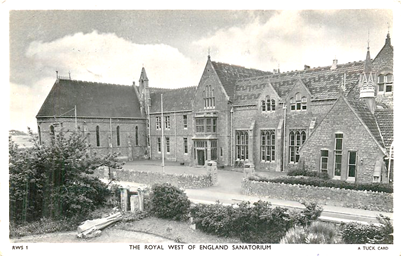
Saturday 24th April 1915
Dear Cyril,
Thanks awfully for your letters and the number of “Punch’s” I hadn’t seen it , but we get plenty of magazines and periodicals here (in reply to your question)
I like this place immensely but wish it would buck up and get warmer.
The man who built this place must have been pretty tinny, as it includes a chapel and swimming baths, and there are stained glass windows all over the place.
The lady superintendent is somewhat of a character. She was Kitchener’s hospital superintendent in Egypt. Woe betide the man who comes in a minute late. He is packed off to Bristol willy nilly, there to subsist on bread and water.
There are several battalions of Kitchener’s Army here, the Royal Welsh Fusiliers, North Staffordshire and Cheshires. They look very fit and of fine physique. It is interesting to watch them going through it. They go to Salisbury Plain next week, soon to be shipped off to the Front, I suppose.
I suppose Scott’s lot are being held in reserve then at present. I was wondering where these ¾ million men could be, as we are holding Ploegsteert Wood with fewer men at the present moment than we actually had there during the winter. The trenches which we have recently taken over from the Somersets and the Rifle Brigade (who have moved along to the left, taking over the part held by the Dublins; there has been a general shuffling, as happens every now and then) taken a very curious line. It is extraordinary how the line bends about. Where we were the trenches were something like this:-
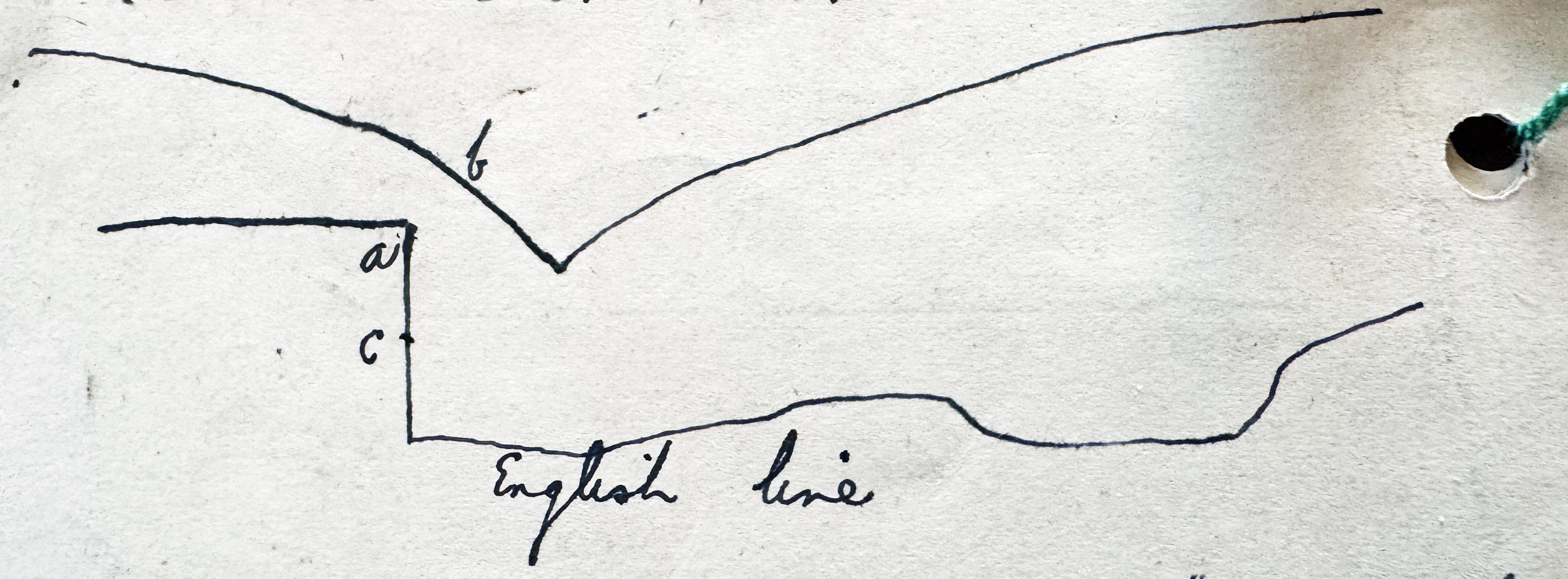
From a to b is 40 yeards. I was at somewhere about c which is about 70/80 yards. You will see our right angle trench is open to enfilade fire. A little further along the trenches are 400 yards apart. Our 18 pounders have the temerity to shell “b” every morning, which is a pretty risky business. One of our shells burst between our own 1st and 2nd lines one morning and part of the casing buried itself between two dugouts. They usually land plump on the German parapet. Ploegsteert Wood is the furthest advanced point along the line and the line bends right back to Armentieres on…..
(remainder of letter missing)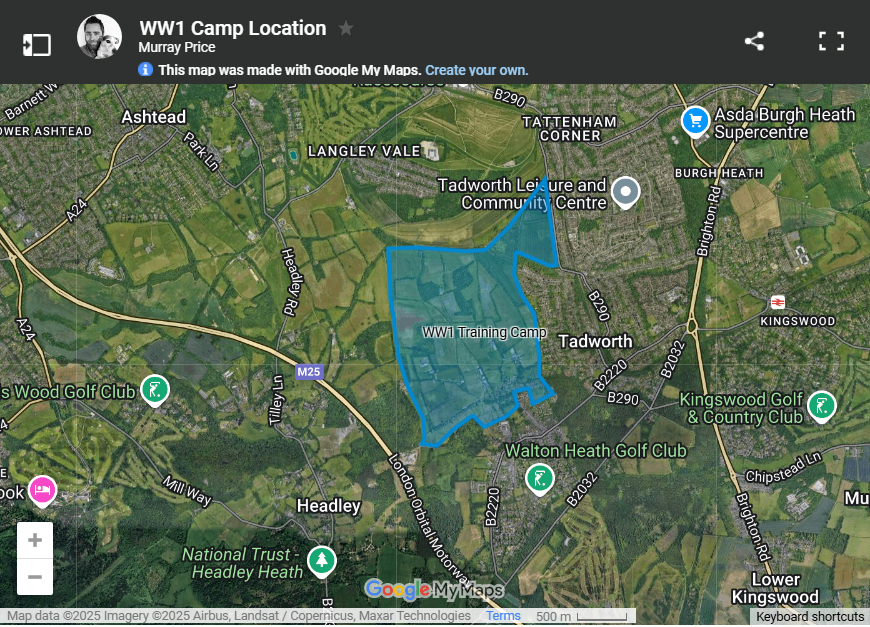
From: Graham Freaker, Tadworth Camp, near Epsom.
During WW1, the Tadworth Camp in Surrey served as a major training ground and camp for thousands of soldiers. The camp was a “miniature city of marquees and tents” stretching from Epsom Downs and Tattenham Corner to Walton-on-the-Hill and Tadworth, and housed up to 8,000 men at its peak. https://beardedbleepers.co.uk/ww1-tadworth-training-camp/
Wed 22nd Sept 1915
Dear Cyril,
I have been down here a week now. I went up to Clapham on Sunday after church parade and paid a visit to Bourneville Road.
It is fairly easy to get up on Saturday or Sunday after parades except when there is fatigue work on, which makes it necessary to remain in camp.
This week No1 Company (??) supplies fire picquet (a small temporary military post closer to the enemy than the main formation; or a group of soldiers detailed for a specific duty e.g., fire picquet) and as there are only about 20/30 fit it means the same men have to do duty in each case and I am not sure about being able to come up to town.
Mother and I had a good many outings when I was home or I had meant to have asked you if you could manage a jaunt or two. Could we fix one up? Do you go for a stroll on Sunday afternoons? As I am uncertain about this weekend, what about the jolly ones?
I have had a letter from Lionel which I enclose as there is nothing very private about it. I had asked him whether you wouldn’t get into the R.E. thro’ the Artists forgetting that only temps commns were given that way. He mentions the R.F.A by mistake. You can keep the letter till I see you.
The C.C. don’t muster many these days.
Hope you are quite fit. Please remember me to your people. About 30/40 men have gone out for a second time. I don’t know when the next draft goes out. I hope it is in the distant future.
Cheery oh
Yours truly
Graham Freaker
(Freakers were good friends of the Hooke family, and neighbours I think)
From: Roland Harris, The Billet
April 26th 1915
Dear Cyril,
Thanks so much for your nice letter of the 21st inst. I am glad you were able to get to Mr Hudson Pope’s meetings. They are helpful though I am not in full agreement with him on certain points.
R Hudson Pope was an evangelist and hymnwriter born in 1879. https://hymnary.org/person/Pope_RH1
Sorry to hear G. Freaker is wounded however he has the luck to be in the old country once more eh?
A good many of our fellows have been hit by these nasty instruments of ‘kulter’ though we give ‘em some back you bet.
"Kultur" as a Propaganda Tool:- The term "Kultur" was used by the German government to portray German culture and values as superior to those of the Allied powers, particularly Britain and France, and to justify their actions in the war.
Old Ray seems to be getting on A1. I am glad. I long to see him and my people again, it seems ages since I left home. It is over 8 months ago since I left London for good. I have been home for one Sunday since that time (Oct 25th) but of course this is only a very short time to spend at home. I remember getting up at 3 in the morning and returning at 10 in the evening and up again at 8 the following morning. Nowadays we always rise at 3 in the trenches. We have 5 ho urs sleep at night. The night watches are arranged from 8pm to 3am. So as there are 3 men to each sentry post we have 2 hours 20 mins guard to do each during the night. I like (as all the chaps to do too) the first guard best because we can lie in till after (times crossed out) PM at night. Of course we take it in turns to do the 1st 2nd & 3rd watches. During the day we each have about 2 hours day observation (with the aid of a periscope) to do and about 4 hours fatigue work filling sandbags digging etc. Things are livening up considerably though along the line and we may have a scrap soon and in a way I shall not be sorry. We feel we want to forward things as much as possible as we don’t want the war to last long if it is possible to prevent it. Well old man I must close now and I hope you are not bored. Write again soon there’s a good chap.
Yours sincerely
Roland DHH??? (Roland G, S or E Harris)
From: Roland Harris, The Trenches
10th March 1916
Dear Cyril,
Thanks so much for the ripping letter you wrote the other day. I am so glad to hear all is going well with you. Isn’t your 6TL going strong. We shall need plenty of officers out here before this dreadful war is over I expect.
The casualties in the last big attack of a week or so ago were tremendous as you no doubt have seen.
This is certainly the most terrific and bloodthirsty war this world has ever known and I hope that there will never be another like it. It has been said by someone and very true too that man has as good a destructive genius as inventive. He invents the most wonderful machinery for furthering the businesses and work of the universe and at the present time invents terrible instruments of destruction. One has only to think of the artillery to realise this. I read only yesterday that 40 men on board the “Inflexible” were killed by the explosion of one shell. Then take the tremendous 18” gun on board the “Lizzie” now in the Dardenelles. what a terrible mess one of the shells she fires would make of a fort or mass of human beings. Ah well, I suppose that all will be right again some day. I pray it may be soon. I am afraid the people at home hardly realise what we are up against, they seem to imagine that we can easily push back the Germans really only it is part of the ‘game’ to wait about now. Well so it is in a way but they will relax their effort and think beating our terrible foe is as easy as ABC.
When you think that Germany is up against the three of the (at least) most powerful nations in the world and is still holding her own. Thank God the Russians are now making some progress and our Dardenelle scheme is progressing as well as can be expected but Germany is by no means beaten yet. The line about here has not changed hardly since October and the enemy is not driven out of France yet let alone Belgium.
It is all very well to say that they are short of food, they are short of ammunition but this is not so at least there is no proof of it. Germany had been preparing for this conflict for years we must remember and we were practically unprepared as the numbers in the army at the time of the outbreak of the war will show. Certainly our men have stepped up well to the ‘colours’ I agree but we shall want still more men considering the size of our enemy’s army.
Well old chap enough of this shop. I really have no news at all to tell you so this will have to suffice I am afraid.
I’m glad Reg is getting on at School. How I wish I could have a game of Rugger occasionally. I miss it a terrible lot. A good hard game now and again would do us the world of good I think. I often think of the ‘???’ Our Sundays are just the same as other days except when we happen to be in billets on a Sunday when we attend service if possible.
I must close now as time is very short. Thanks again for writing.
Your sincere friend
Roland E Harris.
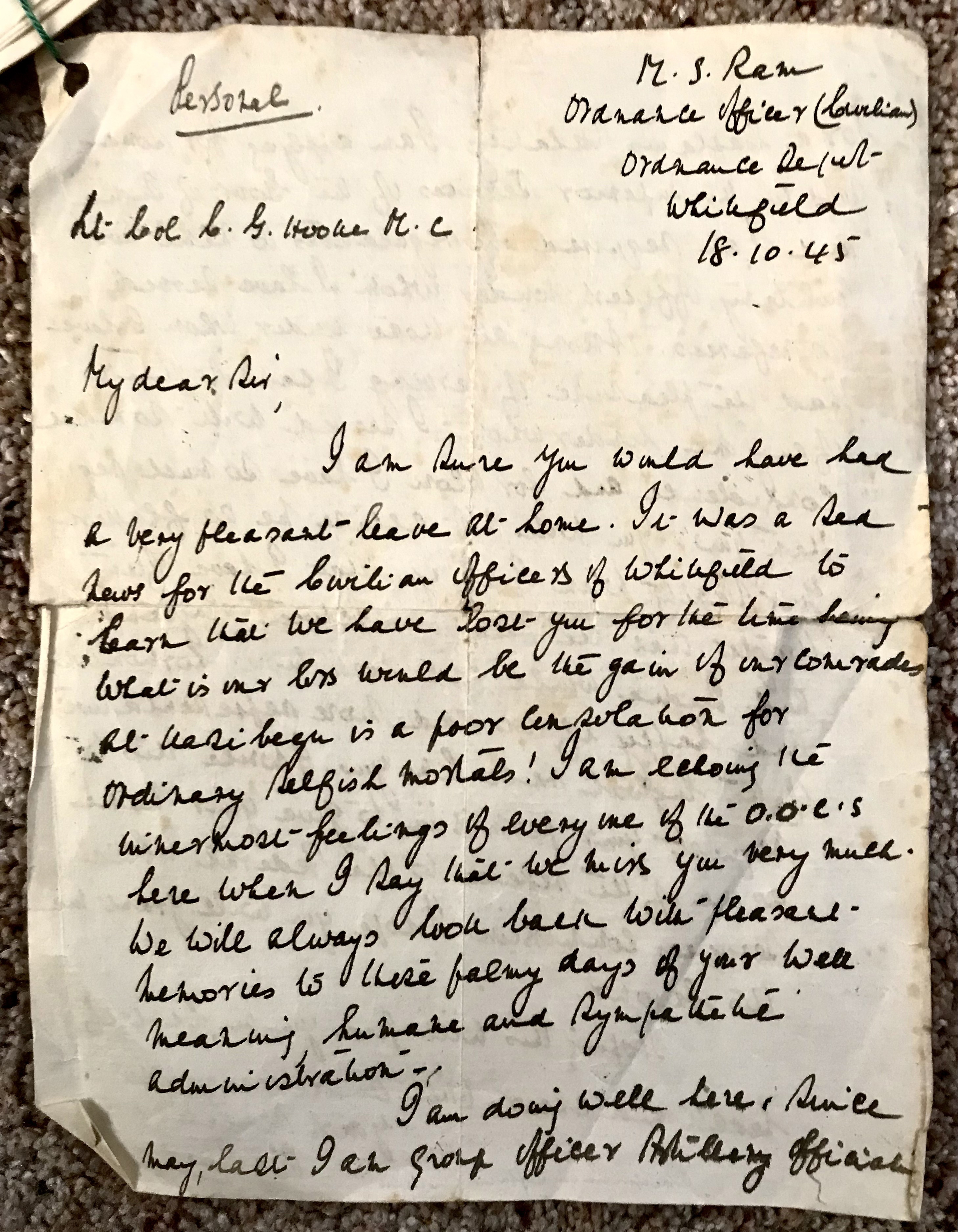
One more letter from 1945
From: M S Ram, Ordnance Officer (Civilian), Ordnance Dept, Whitefield,
To: Lt Col C G Hooke M.C.
18th October 1945
My dear Sir,
I am sure you would have had a very pleasant leave at home. It was a sad news for the Civilian officers at Whitefield to learn that we have lost you for the time being. What is our loss would be the gain of our comrades at ???? is a poor consolation for ordinary selfish mortals! I am echoing the innermost feelings of every one of the O.O.C.S. here when I say that we miss you very much. We will always look back with pleasant memories of those balmy days of your well meaning, humane and sympathetic administration.
I am doing well here. Since May last I am Group Officer Artillery officiating for a Captain’s vacancy. I am applying for some jobs in the Superior Services of the Govt of India and I am required by regulations to name two military officers under whom I have served as referees. Among all those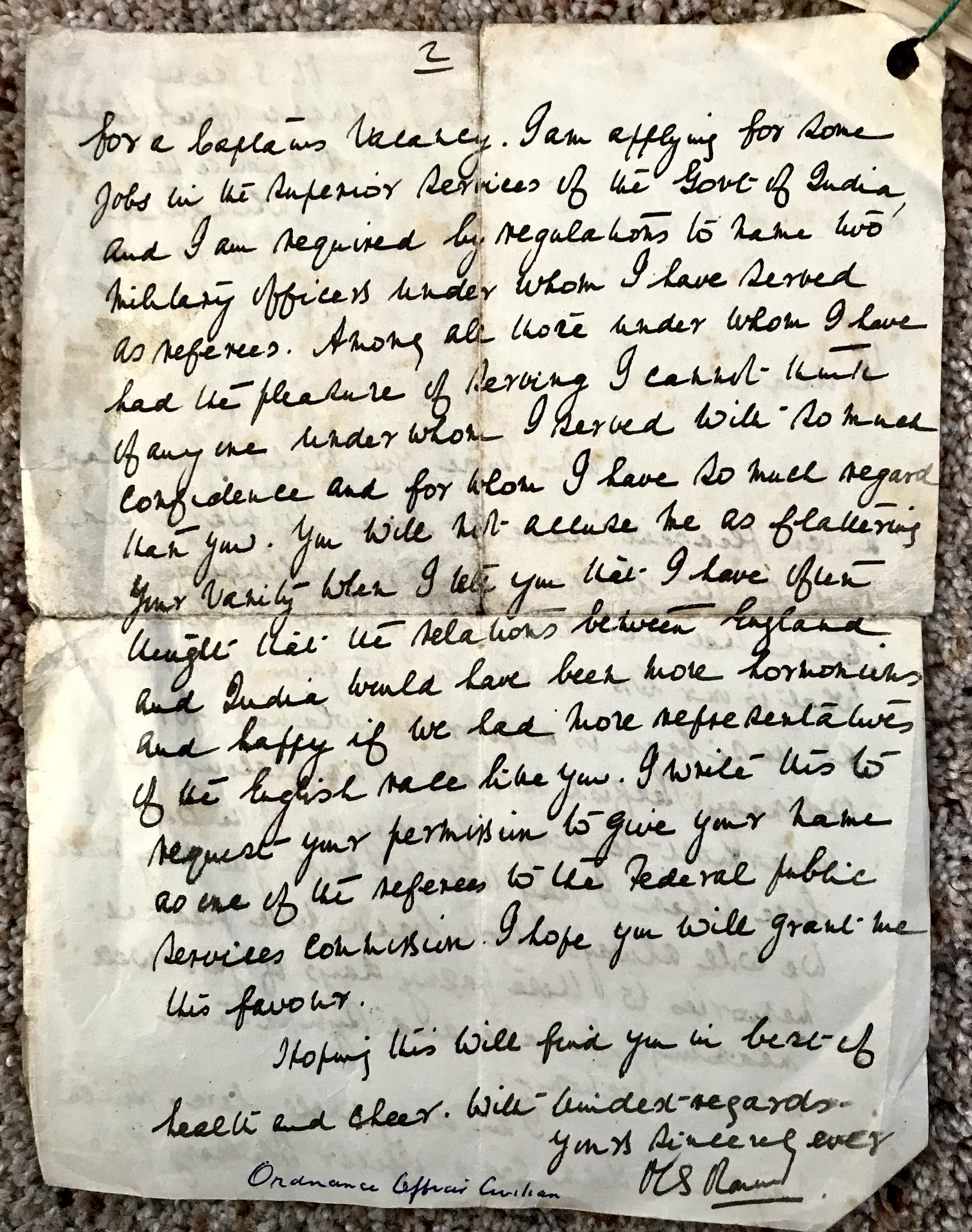 under whom I have had the pleasure of serving I cannot think of anyone under whom I served with so much confidence and for whom I have so much regard than you. You will not accuse me as flattering your vanity when I tell you that I have often thought that the relations between England and India would have been more harmonious and happy if we had more representatives of the English race like you. I write this to request your permission to give your name as one of the referees to the Federal Public Services Commission. I hope you will grant this favour.
under whom I have had the pleasure of serving I cannot think of anyone under whom I served with so much confidence and for whom I have so much regard than you. You will not accuse me as flattering your vanity when I tell you that I have often thought that the relations between England and India would have been more harmonious and happy if we had more representatives of the English race like you. I write this to request your permission to give your name as one of the referees to the Federal Public Services Commission. I hope you will grant this favour.
Hoping this will find you in best of health and cheer. With kindest regards,
Yours sincerely ever
M S Ram
(Ordnance Officer Civilian)
Letters from the Front 1918 (Apr-Sept)
Letters from the Front 1918-19 (Oct-Jan)
